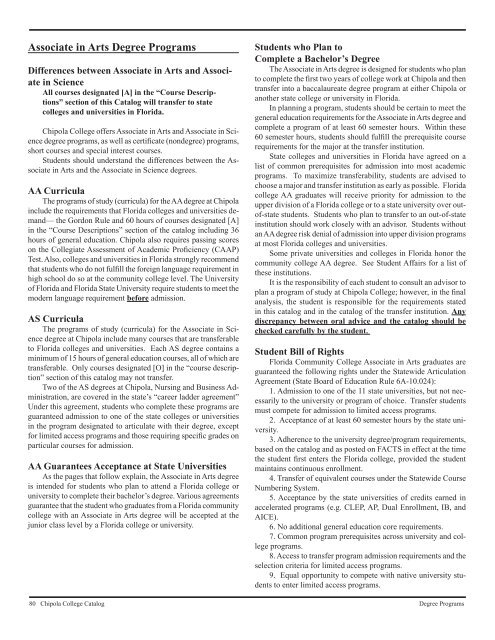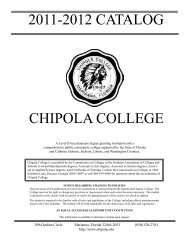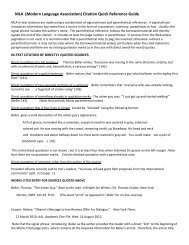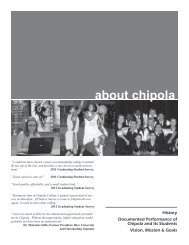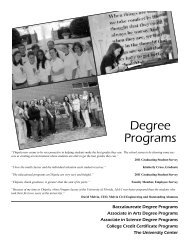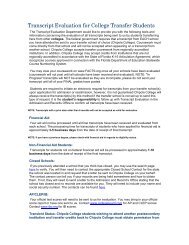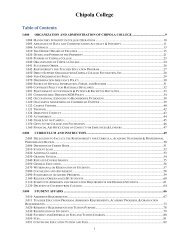programs of study - Chipola College
programs of study - Chipola College
programs of study - Chipola College
Create successful ePaper yourself
Turn your PDF publications into a flip-book with our unique Google optimized e-Paper software.
Associate in Arts Degree Programs<br />
Differences between Associate in Arts and Associate<br />
in Science<br />
All courses designated [A] in the “Course Descriptions”<br />
section <strong>of</strong> this Catalog will transfer to state<br />
colleges and universities in Florida.<br />
<strong>Chipola</strong> <strong>College</strong> <strong>of</strong>fers Associate in Arts and Associate in Science<br />
degree <strong>programs</strong>, as well as certificate (nondegree) <strong>programs</strong>,<br />
short courses and special interest courses.<br />
Students should understand the differences between the Associate<br />
in Arts and the Associate in Science degrees.<br />
AA Curricula<br />
The <strong>programs</strong> <strong>of</strong> <strong>study</strong> (curricula) for the AA degree at <strong>Chipola</strong><br />
include the requirements that Florida colleges and universities demand—<br />
the Gordon Rule and 60 hours <strong>of</strong> courses designated [A]<br />
in the “Course Descriptions” section <strong>of</strong> the catalog including 36<br />
hours <strong>of</strong> general education. <strong>Chipola</strong> also requires passing scores<br />
on the Collegiate Assessment <strong>of</strong> Academic Pr<strong>of</strong>iciency (CAAP)<br />
Test. Also, colleges and universities in Florida strongly recommend<br />
that students who do not fulfill the foreign language requirement in<br />
high school do so at the community college level. The University<br />
<strong>of</strong> Florida and Florida State University require students to meet the<br />
modern language requirement before admission.<br />
AS Curricula<br />
The <strong>programs</strong> <strong>of</strong> <strong>study</strong> (curricula) for the Associate in Science<br />
degree at <strong>Chipola</strong> include many courses that are transferable<br />
to Florida colleges and universities. Each AS degree contains a<br />
minimum <strong>of</strong> 15 hours <strong>of</strong> general education courses, all <strong>of</strong> which are<br />
transferable. Only courses designated [O] in the “course description”<br />
section <strong>of</strong> this catalog may not transfer.<br />
Two <strong>of</strong> the AS degrees at <strong>Chipola</strong>, Nursing and Business Administration,<br />
are covered in the state’s “career ladder agreement”<br />
Under this agreement, students who complete these <strong>programs</strong> are<br />
guaranteed admission to one <strong>of</strong> the state colleges or universities<br />
in the program designated to articulate with their degree, except<br />
for limited access <strong>programs</strong> and those requiring specific grades on<br />
particular courses for admission.<br />
AA Guarantees Acceptance at State Universities<br />
As the pages that follow explain, the Associate in Arts degree<br />
is intended for students who plan to attend a Florida college or<br />
university to complete their bachelor’s degree. Various agreements<br />
guarantee that the student who graduates from a Florida community<br />
college with an Associate in Arts degree will be accepted at the<br />
junior class level by a Florida college or university.<br />
Students who Plan to<br />
Complete a Bachelor’s Degree<br />
The Associate in Arts degree is designed for students who plan<br />
to complete the first two years <strong>of</strong> college work at <strong>Chipola</strong> and then<br />
transfer into a baccalaureate degree program at either <strong>Chipola</strong> or<br />
another state college or university in Florida.<br />
In planning a program, students should be certain to meet the<br />
general education requirements for the Associate in Arts degree and<br />
complete a program <strong>of</strong> at least 60 semester hours. Within these<br />
60 semester hours, students should fulfill the prerequisite course<br />
requirements for the major at the transfer institution.<br />
State colleges and universities in Florida have agreed on a<br />
list <strong>of</strong> common prerequisites for admission into most academic<br />
<strong>programs</strong>. To maximize transferability, students are advised to<br />
choose a major and transfer institution as early as possible. Florida<br />
college AA graduates will receive priority for admission to the<br />
upper division <strong>of</strong> a Florida college or to a state university over out<strong>of</strong>-state<br />
students. Students who plan to transfer to an out-<strong>of</strong>-state<br />
institution should work closely with an advisor. Students without<br />
an AA degree risk denial <strong>of</strong> admission into upper division <strong>programs</strong><br />
at most Florida colleges and universities.<br />
Some private universities and colleges in Florida honor the<br />
community college AA degree. See Student Affairs for a list <strong>of</strong><br />
these institutions.<br />
It is the responsibility <strong>of</strong> each student to consult an advisor to<br />
plan a program <strong>of</strong> <strong>study</strong> at <strong>Chipola</strong> <strong>College</strong>; however, in the final<br />
analysis, the student is responsible for the requirements stated<br />
in this catalog and in the catalog <strong>of</strong> the transfer institution. Any<br />
discrepancy between oral advice and the catalog should be<br />
checked carefully by the student.<br />
Student Bill <strong>of</strong> Rights<br />
Florida Community <strong>College</strong> Associate in Arts graduates are<br />
guaranteed the following rights under the Statewide Articulation<br />
Agreement (State Board <strong>of</strong> Education Rule 6A-10.024):<br />
1. Admission to one <strong>of</strong> the 11 state universities, but not necessarily<br />
to the university or program <strong>of</strong> choice. Transfer students<br />
must compete for admission to limited access <strong>programs</strong>.<br />
2. Acceptance <strong>of</strong> at least 60 semester hours by the state university.<br />
3. Adherence to the university degree/program requirements,<br />
based on the catalog and as posted on FACTS in effect at the time<br />
the student first enters the Florida college, provided the student<br />
maintains continuous enrollment.<br />
4. Transfer <strong>of</strong> equivalent courses under the Statewide Course<br />
Numbering System.<br />
5. Acceptance by the state universities <strong>of</strong> credits earned in<br />
accelerated <strong>programs</strong> (e.g. CLEP, AP, Dual Enrollment, IB, and<br />
AICE).<br />
6. No additional general education core requirements.<br />
7. Common program prerequisites across university and college<br />
<strong>programs</strong>.<br />
8. Access to transfer program admission requirements and the<br />
selection criteria for limited access <strong>programs</strong>.<br />
9. Equal opportunity to compete with native university students<br />
to enter limited access <strong>programs</strong>.<br />
80 <strong>Chipola</strong> <strong>College</strong> Catalog Degree Programs


